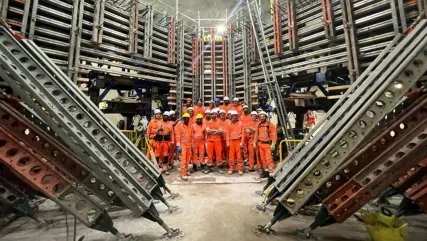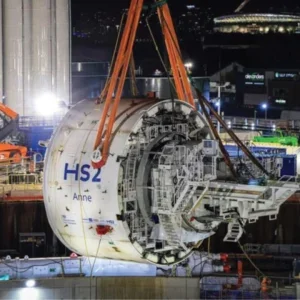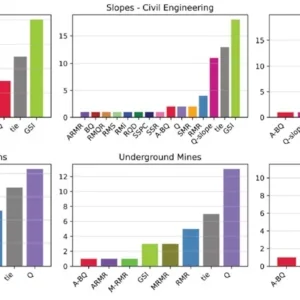
When Joseph (Josie) Gallagher was told he was to be awarded the British Tunnelling Society’s James Clark Medal he received the news with characteristic modesty.
“You could have knocked me over with a feather because normally the people who receive the medal are at the top of blue chip companies, consultants, designers, people responsible for huge projects. For me to get it was a massive honour. It meant my peers thought I have made a contribution,” says Gallagher.
As chairman of Joseph Gallagher Ltd (JGL), the largest tunnelling subcontractor in the UK, and with a lifetime’s work in tunnelling, Gallagher has touched the careers of many so the accolade comes as no surprise to those who know him. The James Clark Medal is awarded in recognition of a contemporary achievement in tunnelling, or innovation or responsibility for a large project, or a major contribution to the tunnelling industry. The BTS felt Gallagher easily fulfilled the criteria.
“In awarding the medal, the committee felt that not only were we acknowledging the enormous contribution that Gallagher has made to the tunnelling business but also providing a token of the contribution that the people of the west coast of Ireland have made,” says BTS vice-chair Ivor Thomas. That contribution began when Gallagher was in his teens and now, at the age of 72, he has no intentions of hanging up his hard hat.
Gallagher was born on Arranmore Island in Co Donegal. Despite his head teacher’s encouragement to pursue secondary education, Gallagher left school at 13 and moved to Scotland with his family where he worked on a farm. His introduction to civil engineering came at the age of 17 when he worked as a banksman to a crane on a reservoir project in Peebles.
In 1965 Gallagher moved to London and began his tunnelling career, working as a miner on the Victoria Line. In 1973 he took a job with Tim Kilroe in Milton Keynes and by the time he established his own company nine years later he had worked at everything from miner’s labourer to miner, lead miner, pit boss and foreman – the latter at the tender age of 22.
HARD KNOCKS
In those early days it was an environment of tough labour and hard knocks.
“Production targets were very high and it was all done manually – there was no machinery at all,” says Gallagher. “Even if you were a good worker it was difficult. You went through the pain barrier every day. You had to have a certain mentality to get through it and only the fittest survived.” In contrast, today the hard physical work is done by machinery. It was during these early years that Gallagher cemented his work ethic and the sense of fairness that are fundamental to his own integrity and to his company’s culture.
And it was from Tim Kilroe, who recognised Gallagher’s ability and promoted him to foreman, that he learned the skills of managing and motivating people.
“He taught me practically everything I know and man management was the greatest skill he taught me. His gift was when he was talking to you, you were the most important person in the world,” Gallagher says.
When he started his own company he adopted not only the red and white livery of Kilroe’s company, but much of the management style as well.
Until four years ago Gallagher was still doing the wages at JGL, which meant he knew the name of every one of the company’s 1,000 employees. Since giving the role to his daughter and senior QS Claire, on subsequent site visits, which he still makes regularly, he was disappointed not to know people’s names so now everyone has their name on their helmet.
“It’s important that your boss can call you by name. If he doesn’t, you don’t feel valued,” says Gallagher.
The site visits mean an early morning start as Gallagher will have a cup of tea with people before they start work. “We’ll talk about football, rugby – anything but work. My people aren’t apprehensive to see me there; they’re not overawed. If you can get people on side like that, the rest is easy,” he says. And everyone who knocks on Gallagher’s door is treated with respect.
“Even those asking for a pay rise are treated with dignity. If I can’t give them a pay rise I’ll tell them why and if they’re good at their job they’ll get one next time and I will honour that. You must make sure they go away happy. If they go off unhappy you’ve lost an employee,” he says.
Working for Tim Kilroe, Gallagher also learned the value of employing the “cream of men”, an approach he emulated when Kilroe gave him his first subcontracting job and which he continued with JGL.
Gallagher established JGL in 1982. Thirty-five years later, that business is an GBP 80M- (USD 102.5M-) turnover international enterprise with five separate companies. It has completed more than 600 jobs, ranging from water infrastructure to a new connection tunnel for the Dorchester in London and many highprofile projects such as the Channel Tunnel Rail Link, Hindhead Tunnel and more recently Crossrail.
JGL’s first sizeable job – and perhaps biggest challenge – was in 1988 with the GBP 11M (USD 14M) contract to upgrade Bank station in London to accommodate the DLR.
“It was one of the biggest challenges I faced,” says Gallagher. “The biggest jobs we’d had until then were about GBP 300,000 and suddenly I won a contract for GBP 11M. I had 15 or so people working for me – all great people – but I needed 400.” Making it even more challenging was the fact the Channel Tunnel was being built at the same time, offering “colossal money”.
“The project was too good to turn down and I decided if I was going to be successful it had to be on price work, not day work. There wasn’t one person on day work and I set all the prices myself,” says Gallagher.
From here JGL continued to grow and expand. In 1990 Gallagher bought Specialist Plant Associates, the only company in the UK to own and operate compressed air tunnelling equipment for rental.
Seven years later JGL purchased NRC Plant, the UK’s second largest crawler crane hire company. It is the sole agent in the UK for Hitachi Sumitomo in Japan and Link-Belt in the US.
In 2007 Japanese company Iseki Microtunnelling was added to the group. The purchase presented another case where Gallagher’s aptitude for tackling problems was required.
“We had about 30 microtunnelling machines and six months after buying the company the bottom fell out of the UK market,” explains Gallagher.
The answer was to go to the Middle East and Iseki now has offices in Kuwait, Bahrain, Oman and Dubai.
The most recent addition was Johnston Trenchless Solutions, purchased from Carillion in 2008. It has a strong presence in northern England and Scotland and undertakes similar work to JGL but on a smaller scale.
JGL has worked for Costain for 30 years and has many other repeat clients. One of the things Gallagher is most proud of is that the company has never lost a client.
“If we failed to get a client’s repeat business I would consider we’d failed,” said Gallagher.
Fair play and honesty have been integral to his relationships with his clients, and he instils the same in his staff. “With clients we have our ups and downs like any marriage but I will not tell them a lie. It may be uncomfortable for me but they know they can trust me. It’s not all about walking away with all you can; it’s about trust and repeat business,” says Gallagher.
“I teach my team to be honest. If you make a mistake, hold your hand up and people will respect you.”
Gallagher’s reputation for expertise and honesty mean he has often been called on in emergencies. In the early 1980s he became a reluctant celebrity when he was involved in a recovery operation in a sinkhole on the Isle of Wight. It was a treacherous task. Gallagher and his two colleagues decided to sink a shaft but there was an 80ft (24m) cliff adjacent to the hole and machinery was hard to come by on the island. The team completed the operation in about six days, with the world’s media watching from the sidelines. On the second day Gallagher emerged from the shaft to find Kate Adie from the BBC ready to interview him.
A few years later, on a Friday after, he had a call from a company that was sinking a shaft near Land’s End in Cornwall. The shaft had flooded and they needed Gallagher’s help. Gallagher and his team were there first thing on Monday morning and remedied the situation – “no contract, nothing on paper, just a handshake”, Gallagher recalls.
In 2014 Gallagher appointed a managing director – Steve Harvey – and took the role of chairman.
“For me that was the biggest day in the business since I formed the company because the next day I wouldn’t be making the decisions,” he says.
He’s happy, however, that Harvey is continuing the culture of fairness. “Steve works very hard; everyone respects him,” says Gallagher.
At the same time, the next generation of Gallaghers has joined the business. One of his sons, Paul, is managing director designate, Claire is senior QS, Sinead is office manager, and sonin- law John O’Dwyer is contracts manager.
The change in role has enabled Gallagher to champion JGL’s health and safety programme. Having started work in an era when health and safety was not a priority, Gallagher is passionate about it.
“In those days you put your life on the line because production targets were everything and your safety was secondary. We were motivated by they money: get the job done, get your weekly salary and forget about the consequences,” he explains.
He is the first to admit that as a younger man he took risks. “How long have you got? I did everything in the book because that was the culture in my day,” he says.
But the mentality has changed and Gallagher wanted to ensure JGL had the right health and safety culture. “I took it on to show the workforce how important health and safety is,” he says.
About two years ago the company brought in Alkoomi, a behavourial safety leadership specialist, to understand people’s behaviour and how to work with it to initiate change.
The result is the group-wide LIFE (Living Incident Free Everyday) programme. Key to it is that managers lead by example, and everybody has mutual respect, aware that their behaviour can affect others working with them.
A large part of its success, says Gallagher, who attends every training workshop, is the fact that the 44 trainers (and another 10 in the pipeline) are from the JGL workforce.
“They train their workmates, and that’s very powerful because they know the person who’s training them. The trainer has to lead by example and work safely himself. It’s training by example,” says Gallagher. There is also further motivation to remind the workforce of health and safety practices. A health and safety best practice award is made on every site every week and the winner receives a GBP 50 voucher. JGL also operates a system of “observation cards” where if a worker isn’t happy with something they can write it on a card and pass it to their manager. For every card received JGL donates GBP 1 to the winning site’s chosen charity.
“The programme motivates the workforce to behave wisely and make the right choices,” he says.
AWARD
This ability to inspire and lead people, to command respect and give respect, and to deliver work fairly and honestly, are the attributes the BTS recognised in awarding the James Clark Medal.
Presenting the medal to Gallagher, vice-chairman Thomas said: “Whoever has worked with Gallagher over the years will appreciate his work ethos on all projects, however big or small, the camaraderie he instils, not only in his own team but which extends to the clients he works alongside, and his innate ability to find ways to move a project forward in even the most trying of circumstances. It is this ability and his determination to succeed that makes his service to the construction field, be it tunnelling of all diameters, lengths and methodologies, reinforced concrete frames or heavy civils, almost unparalleled.
“Gallagher has served the tunnelling industry for over 48 years and is still as passionate and determined as ever to be at the top of his game. As attested by people who have had the privilege to work with him, Gallagher is a true inspiration.”






